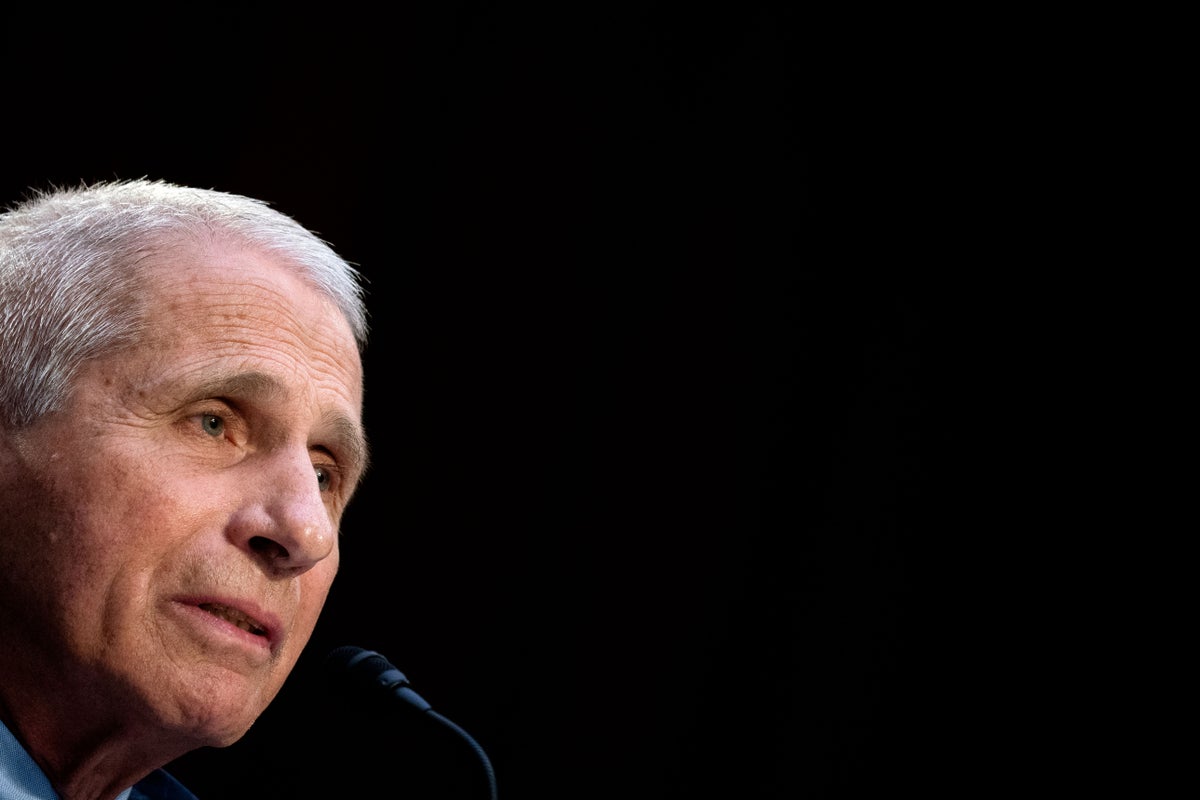
Dr Anthony Fauci, the White House chief medical adviser, is warning Americans “we should not be surprised” if a new Covid variant drives another winter surge in cases.
“We should anticipate that we very well may get another variant that would emerge that would elude the immune response that we’ve gotten from infection and/or from vaccination," Dr Fauci said on Tuesday during an event at the USC Annenberg Center for Health Journalism.
"We are entering into the winter months, where no matter what the respiratory disease is, there’s always a risk of an uptick,” he added.
New coronavirus cases, hospitalisations, and deaths are all down to nearly their lowest levels this year, according to federal data, but we shouldn’t start acting like the pandemic is over, experts say.
"I think it would be a bit cavalier to all of a sudden say we’re completely through with it," Dr Fauci added at the event.
Scientists are monitoring a number of new variants and descendants of Omicron like BQ.1 in the Uk, BA.2.75 and BA.2.75.2 in India, and BA.2.3.20 in Singapore, which could drive cases this winter.
“I’m fairly confident that at least one of these variants or a combination of them will lead to a new infection wave,” Tom Wenseleers, an evolutionary biologist at the Catholic University of Leuven in Belgium, told Nature. "And, because they all seem to be behaving similarly, “at the end of the day it’s not that important which of these become the next big thing.”
The two worst surges of the pandemic, the Delta and Omicron waves, took place in January of 2021 and 2022, as the winter months pushed more people indoors and spurred holiday travel, making disease spread more likely.
More concerning — and more tangible — than the risk of a new variant becoming dominant is the slow rate at which Americans have sought out their latest booster shots.
“The question is not whether we will see an increase in cases and hospitalizations — we will — but by how much,” University of California San Francisco infectious disease expert Peter-Chin Hong told the San Francisco Chronicle.
People getting their boosters, plus the high rate of past infections in the US, would mean a new variant might only cause a “modest increase” in cases because of the “highly protected community,” Dr Hong told the paper.
Meanwhile, if booster rates remain at their measly 4 per cent of eligible patients getting the new jab, it could mean a “larger surge of cases and hospitalizations,” he added.
“The thing I worry about isn’t about whether a surge comes with omicron, but if we don’t get a lot of uptake of the updated vaccine, and we continue to see a lot of mutation, and we have a variant emerge that is really different from anything we’ve seen previously,” Chicago Department of Public Health Commissioner Dr Allison Arwady told NBC Chicago. “That’s what happened last December and January.”
America ranks 16th in the world, and above all other wealthy per nations, when it comes to Covid deaths per population, according to Johns Hopkins University data, but politicians in Washington are largely acting like the US has made it through the pandemic.
In September, President Joe Biden reportedly shocked his own public health teams by declaring, "The pandemic is over.”
"We still have a problem with Covid,” he told CBS. “We’re still doing a lot of work on it ... but the pandemic is over.”
(He later clarified that he meant the pandemic was no longer “where it was” in the past.)
Virtually all US states and cities have dropped their mask mandates, and earlier this year, a federal court in Florida ended the federal mask mandate for interstate transit facilities.
Republicans in Congress have balked at the White House’s request for $22.4bn more in Covid funding.
“It isn’t a question of authority; you have the authority. It isn’t a question of money; you have been given astonishing amounts of money,” Senate Health, Education, Labor and Pensions ranking member Richard Burr of North Carolina said during a hearing in mid-September.
As a result, funding for free Covid vaccines could run out as soon as January 2023, meaning the coronavirus shot will likely become prohibitively unaffordable for those without insurance in the coming months.
As of September, a federal programme sending out free at-home Covid tests also ended.
“It’s potentially history repeating itself. Whether it was first SARS or Zika, or H1N1 back in 2009, the history of public health funding is this predictable feast-famine,” Brent Ewig, chief policy and government relations officer at the Association of Immunization Managers, told Roll Call.
Even the Biden administration’s own officials don’t seem hopeful about where things are heading on the funding front.
This is an obvious movement for the kind of partnership we saw with Operation Warp Speed,” White House Covid-19 response coordinator Ashish Jha told POLITICO, referencing the Trump administration public-private partnership to develop the original Covid vaccines.
Without an infusion of funds for vaccines and new research, the US will soon be in a “very difficult situation” he continued.
“Our toolbox is dry because every company in America understands the U.S. government does not have funding to do this,” he said.







